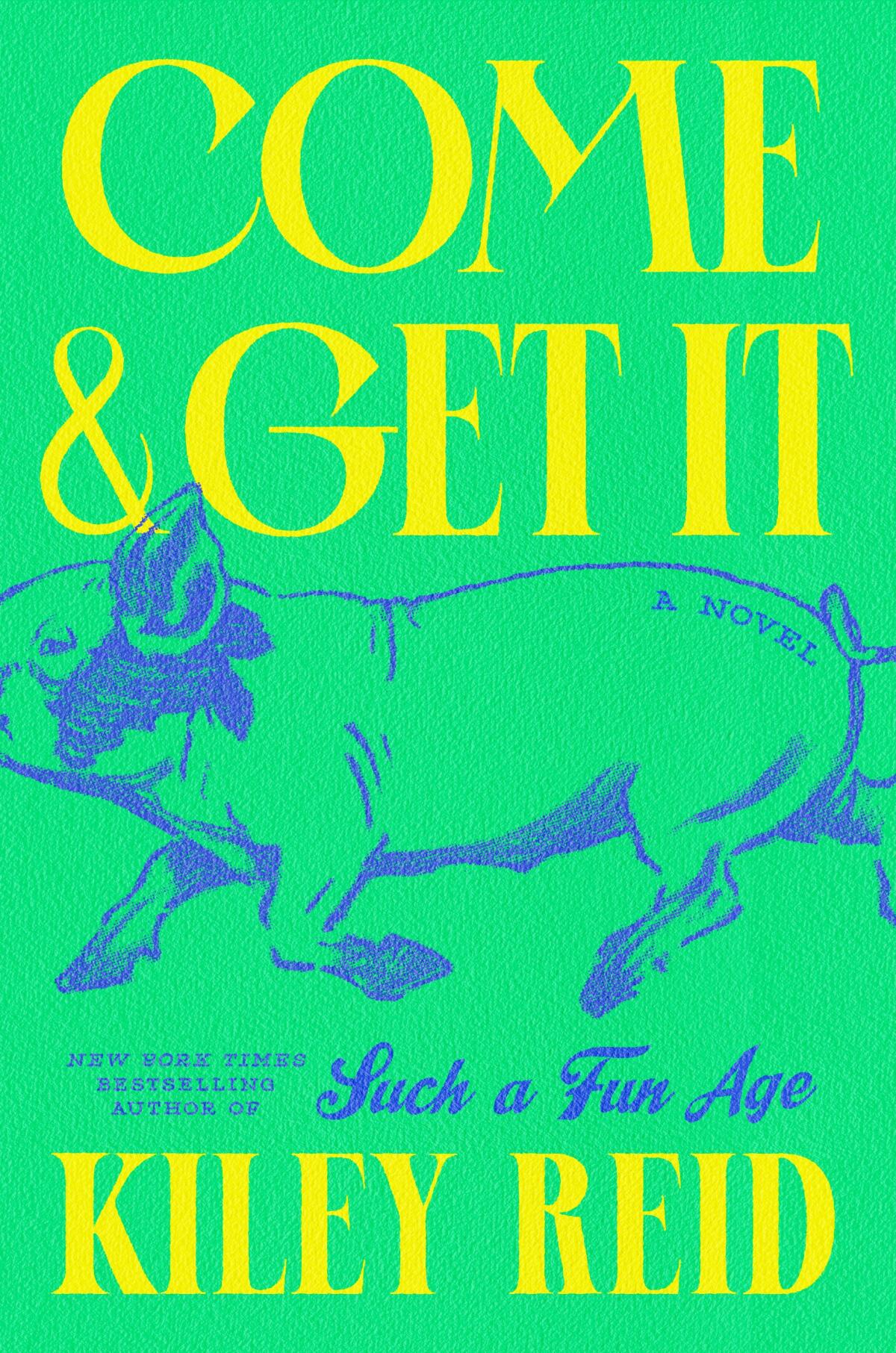Kiley Reid’s ‘Come and Get It’ isn’t just about race, it’s about money

- Share via
On the Shelf
Come and Get It
By Kiley Reid
G.P. Putnam’s Sons: 400 pages, $29
If you buy books linked on our site, The Times may earn a commission from Bookshop.org, whose fees support independent bookstores.
When Kiley Reid was a child, she liked a good scare in her books, “Goosebumps” style. These days, Reid takes on her more adult fears in her novels — first her bestselling 2019 debut, “Such a Fun Age,” and now in its follow-up, “Come and Get It.”
At first glance, it might appear that Reid’s fears revolve around race. Her first novel’s protagonist, Emira Tucker, is a 25-year-old Black woman who encounters trouble while working as a babysitter for an affluent white family and dating a white man with suspicious motives. In her new book, Millie Cousins is an RA in a college dorm, where she is one of only a few Black students and where casual racism stalks the hallways.
But Reid is frustrated by that perception. “Frankly, it’s racist to require Black people to only write about race and teach you something,” she says over a video chat. “My characters are worried about crushes and rent and jobs, all while being Black.”
The true focus of her writing is money: who has it, who needs it and the precarious economy that links the two. “Healthcare in this country dictates so many of our decisions — you can take risks when you feel safe, when you know that if something happens that you’ll be OK,” Reid says. Healthcare, she notes, earns as many mentions in “Such a Fun Age” as race. (She does add, however, that access to healthcare is often tied to race.)
Reid, who was born in Los Angeles and raised in Tucson, Ariz., knows both sides of the coin. She grew up with enough money that she could afford to attend Marymount Manhattan College and live in New York, but she worked in babysitting, retail and restaurants — fields without benefits. “It kept me from performing at my best level even though I know hopefully my parents would step in if I had an accident.”
Amina Akhtar’s third novel, ‘Almost Surely Dead’ — the next book from Mindy Kaling’s Amazon imprint — is part supernatural thriller, part social commentary, part family saga.
“Come and Get It” is “about buying things and how we spend our money,” Reid says.
Millie is working hard to save up to buy her own house after college, no matter how small and in need of repairs; her white classmates have money to burn and often do, while their parents effortlessly replenish their accounts.
Through these students’ interviews with Agatha Paul, a professor who writes about money, Reid unpacks the unsettling dynamics of college campus capitalism.
“I’m very interested in how money guides relationships between people,” Reid says. For instance, technology has changed the way people communicate about money. “There are the linguistics, like when a noun easily becomes a verb like, ‘I’ll Venmo you,’ but also the way. If someone owed you money when I was in college, you would have to remind them face to face.”
While that induces its own anxiety, what seems scarier to Reid is always communicating through screens and social media. “I wouldn’t want to do it,” she says of dealing with these issues as a college student now. (She is speaking from her home in Ann Arbor, where she lives with her husband and toddler and teaches at the University of Michigan.)
But what scares Reid most of all is “stuff.”

“I’m terrified of the ability that we have to fill our homes up with stuff that we don’t need, and the ability of capitalism to convince you that you need things and that if you buy something, you can run faster or think better, be stronger,” she says. One of her student characters, Kennedy, learns from her mother to assuage her fears by filling her dorm room with useless goods. “We are all that person in Target, having a panic attack but buying stuff because we feel bad,” Reid says.
“Come and Get It” is set in a dorm for transfers and scholarship students at the University of Arkansas in Fayetteville. Much of the plot is propelled by Agatha’s own curiosities and her carelessness, which derive from being both white and relatively affluent. But as Millie sheds her natural cautiousness, she becomes reckless, both in her sexual explorations and in the way she treats the students she’s meant to be overseeing.
Reid, 37, chose Fayetteville for both personal and practical reasons. She moved there after her husband was offered a job; she worked in a coffee shop, wrote articles for a local magazine and fell in love with this walkable and livable college town. “I’ve never slept better or written more productively than when I was there,” Reid says; this was where she wrote her first chunks of “Such a Fun Age.”
Reid finished her novel at the Iowa Writers’ Workshop. While teaching at the University of Iowa, she developed an Agatha-like interest in the lives of her students, and also in their vernacular. “To be honest,” she says, “what may have kicked off this novel was how, if my students had an opinion on something and I said, ‘Tell me more,’ they would all say, in the exact same way, ‘Oh my gosh, I hate telling about this.’ There was something so tender in that phrasing and how many of them would say it.”
Deborah G. Plant, a scholar of Black literature, found more personal inspiration for her new book, ‘Of Greed and Glory: In Pursuit of Freedom for All.’
Reid interviewed students at Iowa, Arkansas and other universities. The novel captures everything about campus life — from partying to gossiping to “people alone in their rooms freaking out about themselves.” While “Such a Fun Age” tilted toward a satire of Philadelphia’s gentrifying class, this time Reid aimed her anthropology at something “true and delicate and intimate. No one takes these students seriously and I wanted to highlight their intelligence.”
Still, her characters aren’t above being selfish, petty and cruel, making hurtful comments or playing mean-spirited practical jokes and passing them off as trivial. “These moments are so small and delicate and humiliating, but they imprint on you in a certain way,” she says, adding that she still lies in bed at night regretting mean things she said or did in college.
Reid is optimistic about a broader critical response to “Come and Get It” beyond the role race plays, but also understands how much the timing of her debut had to do with its reception. “When George Floyd was murdered many people were saying, ‘What can I do to help? Let me support Black artists,’” she recalls. “When you’re buying a book in response to the death of a Black man, you are going to read it under a different light. And if you’re feeling terrible and turn to art, that’s beautiful but I would hate for anyone to think that consumption can cure racism. People felt, ‘I read it, I’m done, I’m good.’”
File under Reid’s fear of stuff: buying and consuming something to keep the real reckoning at bay.
While Reid was profoundly moved to have Black women tell her, “This is the first time I heard my friends talking” or “I didn’t know Black women could be literary characters.” She was less charmed by the “white women begging me to tell them what to do or crying or telling me that they are actually really close with their nanny.”
And she knows that ultimately she can’t control how her new novel will be perceived. “There’s the book you write and the book people read,” she says. “I wouldn’t want to go into everyone’s house and say, ‘You read it wrong.’ What people get from it is what they should get from it.”
Reid will be discussing her new novel at All Saints Church in Pasadena on Feb. 15 at 7 p.m.
More to Read
Sign up for our Book Club newsletter
Get the latest news, events and more from the Los Angeles Times Book Club, and help us get L.A. reading and talking.
You may occasionally receive promotional content from the Los Angeles Times.












